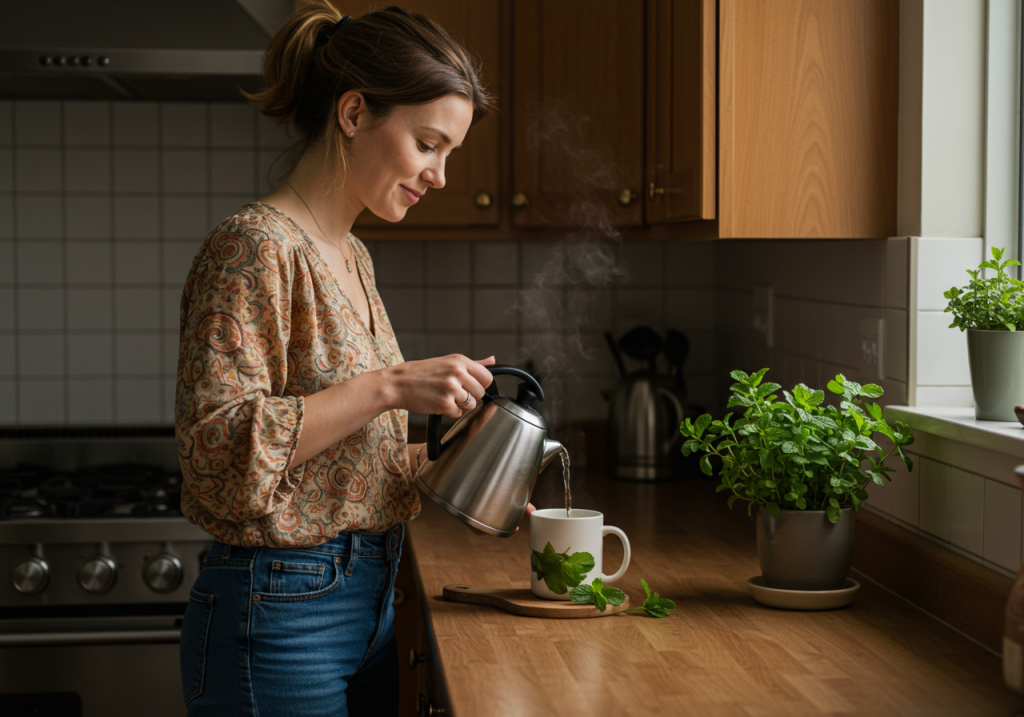What Are Natural Ways to Improve Digestion?

Let’s kick things off with something we all know but don’t always prioritize: what you put on your plate matters. A diet bursting with fiber-rich foods is one of the simplest answers to the question, “What Are Natural Ways to Improve Digestion?” Picture fiber as your gut’s personal trainer—it keeps everything moving and toned. Load your meals with vibrant fruits like apples and berries, crunchy vegetables such as carrots and broccoli, hearty whole grains like quinoa or oats, and protein-packed legumes like lentils and chickpeas. These foods don’t just taste good; they act like a broom, sweeping through your intestines to keep blockages at bay. Ever noticed how a crisp apple leaves you feeling lighter? That’s fiber doing its magic, tackling bloating before it even starts.
But it’s not just about what you eat—it’s how you eat it. Have you ever scarfed down a meal so fast you barely tasted it? I’ve been there, rushing through lunch like it’s a race. Turns out, slowing down is another key to answering “What Are Natural Ways to Improve Digestion?” When you chew your food thoroughly, you’re giving your stomach a head start. It’s like chopping wood into smaller pieces before tossing it into the fire—easier to handle. Plus, mindful eating lets your brain catch up with your belly, signaling fullness before you overdo it. Trust me, there’s nothing worse than that overstuffed feeling after a holiday feast. A little patience at the table can save you a lot of discomfort later.
Hydration deserves a spotlight too. Water is the unsung hero of digestion, keeping things sliding along smoothly. If you’re wondering, “What Are Natural Ways to Improve Digestion?”—start with a tall glass of H2O. It’s like oil in an engine; without it, everything grinds to a halt. Not a fan of plain water? Jazz it up with a squeeze of lemon or a handful of cucumber slices. Herbal teas can also join the party—ginger and peppermint varieties are especially great for calming an upset stomach. I’ve found a warm cup of ginger tea after dinner feels like a gentle reset for my gut. It’s a small habit with big rewards.
Movement is another natural gem. You don’t need to run a marathon—just a brisk walk can do wonders. Imagine your intestines as a lazy river; a little exercise is the current that keeps it flowing. After a big meal, I love taking a short stroll around the block. It’s not just about burning calories; it’s about giving your digestive system a friendly nudge. So, if you’re asking, “What Are Natural Ways to Improve Digestion?”—lace up your sneakers and get moving. It’s amazing how something so simple can make such a difference.
And here’s a fun one: probiotics. These tiny gut warriors are found in foods like yogurt, kimchi, and sauerkraut. They’re like the life of the party, keeping your gut’s bacterial balance in check. I started adding a dollop of Greek yogurt to my breakfast a few years back, and it’s been a game-changer. If you’re curious about “What Are Natural Ways to Improve Digestion?”—inviting these beneficial bacteria into your diet is a delicious and effective step. Your gut will thank you with every happy gurgle.
Next time your stomach’s grumbling in protest, try these tricks. They’re natural, easy, and a loving gift to your digestive system.

Unlocking Digestive Health: 10 Natural Remedies You Can Try Today!
Let’s dive into some specific remedies, starting with ginger. This spicy root isn’t just for stir-fries or holiday cookies—it’s a digestion superstar. Whenever I feel queasy, a mug of ginger tea is my go-to. It’s like a warm hug for my stomach, easing nausea and helping food move along. If you’re wondering, “What Are Natural Ways to Improve Digestion?”—ginger is a must-try. You can grate it fresh into hot water or even nibble on a small piece. It’s zesty, sure, but oh-so-worth it.
Probiotics are up next, and they’re a big deal for a reason. Found in yogurt, kefir, and tangy fermented treats like pickles or kimchi, these good bacteria are like your gut’s personal bodyguards. They fend off the troublemakers and keep everything running smoothly. I’ll never forget my first taste of kimchi—spicy, sour, and surprisingly addictive. It’s now a staple in my fridge, and my digestion’s never been happier. Asking “What Are Natural Ways to Improve Digestion?”—look no further than these fermented wonders.
Peppermint’s another hero in this lineup. Its cool, refreshing vibe isn’t just for toothpaste—it’s a natural soother for bloating and cramps. I keep peppermint tea bags handy for those days when my stomach feels like a balloon. Sipping it slowly is pure relief, like a breeze calming a stormy sea. It’s one of those answers to “What Are Natural Ways to Improve Digestion?” that’s both practical and enjoyable.
Then there’s apple cider vinegar, a pantry staple with a punch. A teaspoon mixed into water before meals can kickstart your digestion, breaking down food more efficiently. It’s tart, no doubt, but think of it as a secret weapon. I was skeptical at first—vinegar for digestion? But after trying it, I felt lighter after meals. It’s a quirky yet effective response to “What Are Natural Ways to Improve Digestion?”

And let’s not overlook fiber again—beans, lentils, and whole grains are your gut’s best pals. My grandma swore by her bowl of oatmeal every morning, and now I get why. It’s like a steady hand guiding your digestion along. These remedies are simple, natural, and ready to transform your gut health today.
From Herbs to Probiotics: Your Guide to Naturally Boosting Digestion
Herbs are like nature’s little helpers, and they’re a fantastic place to start. Take basil, for instance—it’s not just for pasta. It can calm an upset stomach and add a fresh twist to your meals. Then there’s ginger, which I can’t praise enough. It’s like a trusty sidekick, reducing nausea and settling things down after a heavy meal. I love tossing it into smoothies for a zingy boost. When people ask, “What Are Natural Ways to Improve Digestion?”—herbs like these always top my list.
Peppermint’s back in the game here too. Brewing a cup of mint tea after dinner has become my evening ritual. It’s not just tasty—it eases cramps and makes my stomach feel at peace. It’s one of those small joys that doubles as a digestive aid. Fennel’s another herb worth mentioning. Chewing on a few seeds after a meal can cut down on gas and bloating. It’s an old-school trick my mom taught me, and it still works like a charm.
Now, let’s talk probiotics again because they’re too good to skip. These live cultures in yogurt, kefir, and sauerkraut are like tiny cheerleaders for your gut. They boost the good bacteria, keeping the bad ones in check. I started sneaking kefir into my morning smoothies, and the difference is night and day. If you’re searching for “What Are Natural Ways to Improve Digestion?”—probiotics are a no-brainer. They’re natural, tasty, and oh-so-effective.
Adding these into your routine doesn’t have to be a chore. Sprinkle herbs on your dishes, sip some tea, or enjoy a probiotic-rich snack. It’s all about small changes that pack a big punch for your gut.

Say Goodbye to Bloat: 7 Natural Ways to Enhance Your Digestive System
Bloating’s the worst, right? It’s like your stomach’s staging a sit-in. First up, hydration can save the day. Water breaks down food and prevents constipation, which is often the bloating culprit. I aim for eight glasses daily—it’s a habit that’s become second nature. If you’re asking, “What Are Natural Ways to Improve Digestion?”—water’s your starting line.
Fiber’s back too, because it’s that good. Fruits, veggies, and whole grains keep things moving, whisking away the gunk that causes puffiness. I’ve learned to love a big salad loaded with spinach and avocado—it’s like a reset button for my gut. Probiotics join the fight against bloating too, balancing your gut bacteria like a pro. A spoonful of yogurt with honey is my sweet fix for a happier belly.
Ginger’s a bloating buster as well. A cup of ginger tea feels like a warm wave washing away discomfort. It’s spicy, sure, but it settles my stomach every time. Stress can sneakily worsen bloating too—ever feel your gut tighten during a tough day? I’ve started doing deep breathing exercises, and it’s like flipping a switch. My mind calms, and my digestion follows suit. These seven tricks are your ticket to a bloat-free life—natural and totally doable.
Eat Better, Digest Better: Top Natural Foods for Optimal Digestion
Bananas are a standout here. They’re not just a quick snack—they’re fiber-packed and gentle on your gut. I grab one when I’m on the go, and it’s like a mini tune-up for my digestion. Potassium keeps everything balanced too. If you’re pondering, “What Are Natural Ways to Improve Digestion?”—bananas are a tasty answer.
Probiotics return, because they’re MVPs. Yogurt, kimchi, and sauerkraut keep your gut buzzing with good bacteria. I’ve gotten hooked on sauerkraut with my sandwiches—it’s tangy and does wonders. Ginger’s a repeat player too, soothing nausea and speeding up digestion. A splash in my tea or stir-fry keeps things lively.
Leafy greens like spinach and kale are powerhouses too. They’re loaded with fiber and nutrients, sweeping your gut clean. I toss them into everything—salads, smoothies, you name it. These foods aren’t just good for you—they’re a delicious way to keep your digestion on track.
Gut Check: Discover the Power of Natural Herbs for Digestion Improvement
Let’s talk about herbs—those unassuming little plants that pack a mighty punch when it comes to your gut. If you’ve ever wondered how something as simple as a sprig or seed can transform your digestion, you’re in for a treat. First up is ginger, a fiery root that’s been a staple in my kitchen for years. It’s not just a flavor booster for stir-fries or a zesty kick in tea—it’s a bona fide digestion rockstar. I remember the first time I sipped ginger tea after a too-big dinner; it was like a warm wave washing away that queasy, overstuffed feeling. Ginger’s spicy edge isn’t just for show—it’s been used for centuries to tackle nausea, soothe upset stomachs, and get things moving again. Picture it as a friendly firecracker, sparking your digestive system back to life when it’s feeling sluggish.
Then there’s peppermint, the cool kid of the herb world. This isn’t just the stuff of candy canes or gum—it’s a natural soother that can work wonders for your belly. I keep a stash of peppermint tea bags in my cupboard for those days when cramps or bloating sneak up on me. One sip, and it’s like a refreshing breeze sweeping through my stomach, calming everything down. What’s wild is that peppermint doesn’t just stop at digestion—it’s got this bonus perk of sharpening your focus by boosting blood flow. I’ve noticed that after a cup, I feel both relaxed and alert, like I’ve hit the reset button on my body and mind. It’s a two-for-one deal I can’t get enough of.

And let’s not sleep on fennel seeds—they’re the unsung heroes of this trio. These tiny, licorice-scented seeds might not look like much, but they’re nature’s problem solvers. I picked up this trick from my aunt years ago: chew a small handful after a heavy meal, and watch bloating and gas vanish like magic. It’s almost like they’re a natural air freshener for your insides, clearing out the discomfort and leaving you feeling light. If chewing’s not your thing, try steeping them in hot water for a soothing fennel tea. I’ll never forget the first time I tried it after a rich pasta dinner—pure bliss, like my stomach was finally at peace.
Here’s the best part: you don’t need a green thumb or a fancy kitchen to make these herbs your allies. Sprinkle fresh basil or mint on your salads for a flavor boost that doubles as a digestion aid. Grate some ginger into your morning smoothie for a zingy wake-up call. Or brew a warm cup of herbal tea when the day’s winding down. I’ve gotten into the habit of keeping a jar of dried peppermint and fennel seeds on my counter—they’re my go-to fix when my gut needs a little love. The more you weave these herbs into your routine, the more you’ll notice your digestion thanking you. It’s amazing how something so simple can feel so powerful, isn’t it?
Nature’s Solutions: How to Naturally Tackle Common Digestive Issues
When your stomach’s acting up, it’s tempting to reach for a quick fix from the medicine cabinet. But let me tell you—nature’s got some solutions that are just as effective and a whole lot gentler. Take ginger, for starters. This trusty root is like that friend who always knows how to cheer you up, no matter how rough things get. I’ve lost count of how many times a slice of fresh ginger or a steaming mug of ginger tea has saved me from nausea. Whether it’s motion sickness from a bumpy car ride or that uneasy feeling after too much takeout, ginger’s been a game-changer. It’s been soothing bellies for centuries, and for good reason—it calms inflammation and gets your digestion back on track. Next time you’re feeling off, try grating some into hot water with a squeeze of lemon. Your belly will practically sing its praises.
Peppermint’s another heavy hitter in nature’s lineup. Forget the idea that it’s just for freshening your breath—this herb is a digestive powerhouse. I started keeping peppermint tea on hand after a friend swore it helped her cramps, and let me tell you, she wasn’t exaggerating. One cup after a big meal, and it’s like a gentle hug for my stomach, easing those tight, uncomfortable spasms. It’s not just about comfort, though—peppermint helps food move through your system more smoothly, cutting down on that heavy, sluggish feeling. I’ve even started growing a little pot of it on my windowsill so I can pluck a few leaves whenever I need them. It’s a small effort for a big reward.
Now, let’s shine a light on fiber—the unsung hero that doesn’t get nearly enough credit. Think of it as a traffic cop for your intestines, directing everything to keep moving smoothly. I used to overlook fiber until I realized how much better I felt after adding more oats, beans, and fruits to my meals. A bowl of oatmeal with sliced apples in the morning? It’s like sending a crew of tiny construction workers to repair and improve my digestive highway. Foods like lentils, berries, and broccoli are just as clutch—they bulk things up and prevent that dreaded constipation that can throw your whole day off. I’ve learned the hard way that skipping fiber is a recipe for discomfort, and now I make sure it’s a non-negotiable part of my plate.
Probiotics deserve their moment too. These friendly bacteria are like the guardians of your gut, found in yogurt, kimchi, sauerkraut, and kefir. I got hooked on kimchi after a friend brought some to a potluck—it’s spicy, tangy, and surprisingly addictive. But beyond the flavor, it’s teeming with good bacteria that keep the harmful ones in check. Picture them as tiny soldiers patrolling your digestive system, ensuring everything runs like a well-oiled machine. I’ve started adding a dollop of Greek yogurt to my breakfast or a side of sauerkraut with dinner, and the difference is night and day—less bloating, more balance. It’s like my gut’s throwing a little party every time I eat them.

The beauty of these natural fixes is how easy they are to embrace. You don’t need a pharmacy run—just a trip to your kitchen or local market. Next time your digestion’s throwing a tantrum, skip the over-the-counter stuff and try these instead. Brew some tea, toss some oats into your bowl, or savor a probiotic-rich snack. It’s comforting to know that the simplest solutions can sometimes be the most powerful, don’t you think?
The Digestive Revolution: 10 Holistic Habits to Improve Your Gut Health
Your gut’s like a garden—it needs care, attention, and the right conditions to thrive. Ready to start a little digestive revolution? Let’s begin with the basics: eating a variety of fiber-rich foods. Fruits like apples and pears, veggies like carrots and kale, and whole grains like quinoa and brown rice are the sunlight your gut craves. I used to think a plain diet was fine, but once I started mixing it up with colorful produce and hearty grains, my digestion felt like it had woken up. These foods keep things moving and feed your gut’s good bacteria, setting the stage for everything else.
Speaking of feeding the good guys, prebiotics are your next step. Think of garlic, onions, and bananas as the fertilizer that nourishes those beneficial microbes. I’ve gotten into roasting garlic with my veggies—it’s sweet, savory, and a sneaky way to boost my gut health. Bananas are my grab-and-go prebiotic fix; they’re portable and pair perfectly with a handful of nuts. It’s like giving your gut garden the nutrients it needs to bloom.
Probiotics are the workers who keep that garden flourishing. Found in yogurt, kefir, and fermented goodies like miso and tempeh, these little superheroes defend against the bad bacteria trying to crash the party. I started blending kefir into my smoothies a while back, and it’s become a morning ritual I look forward to—creamy, tangy, and oh-so-good for my gut. A small serving of sauerkraut with lunch or dinner adds that extra layer of protection. It’s like hiring a team of tiny defenders to keep everything in harmony.
Hydration’s non-negotiable too. Imagine trying to grow flowers in dry, cracked soil—it’s a struggle, right? Water keeps your gut producing the mucus that helps digestion flow smoothly. I aim for eight glasses a day, sometimes tossing in cucumber slices or a splash of citrus to keep it interesting. It’s a simple habit that makes a massive difference—less constipation, more comfort.

Exercise is another piece of the puzzle. A brisk walk after meals or a gentle yoga session gets your intestines moving, like a soft nudge to keep the river flowing. I love strolling around my neighborhood after dinner—it’s relaxing and gives my digestion a boost. Stress management’s just as crucial—negative vibes can choke your gut health like weeds in a garden. I’ve found that ten minutes of deep breathing or a quick meditation session unwinds me like nothing else. It’s like flipping a switch, letting my body focus on digesting instead of stressing.
Sleep’s the secret weapon here. A well-rested body repairs and rejuvenates overnight, and your gut’s no exception. I used to skimp on sleep, but once I started prioritizing those seven or eight hours, I noticed my digestion felt smoother, less erratic. It’s like giving your gut a chance to shine while you’re dreaming.
Eating slowly ties it all together. Rushing through meals used to be my norm, but chewing thoroughly and savoring each bite has changed the game. It’s easier on my stomach and helps me enjoy my food more. Add in mindful eating—putting down the phone, tuning into flavors—and you’ve got a recipe for gut bliss. These ten habits aren’t just quick fixes; they’re a lifestyle shift that makes your gut sing. A happy gut really does mean a happier you, doesn’t it?




